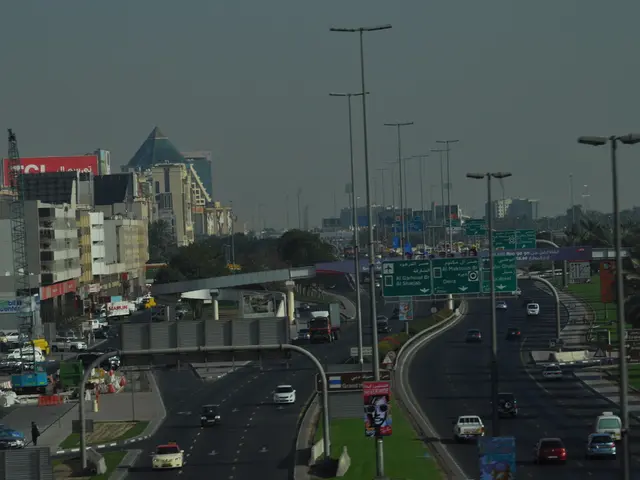Get a Grip on the Globalized Political Game
National Politics Adjusting to Globalization: Reduced Significance of Borders in Politics Across the Globe
Ready to dive into the mind-blowing world of globalization's impact on national politics? Buckle up, as we're about to ride a roller coaster of cultural exchange, economic blow-ups, and political identity shifts, all tethered to this interconnected global economy and culture.
Globalization, a behemoth you can't ignore, is defined broadly as the growing interdependence and interconnectedness between nations. Dating back to the Age of Exploration and the Industrial Revolution, it's shaped how countries relate to each other, leading us right here, where borders become less relevant, and political landscapes go intergalactic.
In today's whacked-out world, globalization flames up power dynamics and governance structures like nobody's business. Trade liberalization, technology, and multinational corporations fuel a political climate that transcends national boundaries. One country's decision can soup up the impacts for others, whether it's supply chain disruptions or environmental policies that require international buy-in. Don't believe me? Check out theWIDER database for insights!
But wait, it gets better! The United Nations and the World Trade Organization aren't just global governance institutions; they're the sauce in this global politics soup. They slap on the brakes or hit the gas on cooperation between countries, covering subjects like trade, security, and human rights. Watch out, though – sometimes they step on toes, challenging national sovereignty. Prepare to hear plenty of bickering on the appropriate balance between global and national interests.
Understanding the globalization-politics dance is essential in today's world, where borders are being questioned. Politicians gotta navigate this intricate landscape to tackle pressing issues like climate change, economic inequality, and public health crises. By teasing apart globalization's influence on national governance, you'll have a sneak peek into its broader implications for democracy, identity, and social cohesion within individual nations.
The Erosion of Sovereignty
Here comes a boring part: national sovereignty, defined as a state's ability to govern itself without outside intervention. But stick with me – globalization's got this thang under control. Supranational organizations and international treaties like the EU, UN, and WTO create a new normal for national policies, with external factors dictating the scene. Greenhouse gas emissions, trade regulations, and human rights practices are all subject to these international agreements, leaving room for only so much independence. Take a gander at the Stockholm Treaty, and you'll see what I mean!
Recent history's got some lessons for ya. After Brexit, the UK found itself wrestling with EU regulations for decades, and even today, they're still tying up loose ends. Similarly, countries struggling with climate change find themselves entrapped by global targets, like those set by the Paris Accord, restricting their ability to carve out environment-focused policies tailored to specific local contexts.
Economic Interdependence: The Political Pressure Cooker
Now let's talk economics, home to frenemies like trade agreements and multinational corporations. These buddies force nations into encapsulating each other's markets, blurring the lines between domestic and international politics – making decisions influenced by global economics and causing local political debates to revolve around the implications of integration. Wax poetic about the North American Free Trade Agreement (NAFTA) and the Comprehensive and Progressive Agreement for Trans-Pacific Partnership (CPTPP), because they're the epitome of economic interdependence!
Crises don't play around, man! Check out the 2008 financial crisis, caused in part by a downturn in the US economy. The domino effect of its shit show resulted in a global recession, causing political repercussions worldwide. Naive political leaders, disregarding economic interconnectedness, found themselves reeling from the fallout. Learn about the risks and setbacks of interconnected economics at the Federal Reserve Bank of St. Louis!
Culture Mash-Up: Stirring Up Political Identity Questions
The Internet and social media are speeding up this cross-cultural exchange, exposing people to diverse cultures, ideas, and perspectives, which seriously influence their political identities. Stuck at home, binge-watching Netflix shows, or spending hours on Twitter means constant exposure to new concepts, which continuously renegotiate our identities. Catch up on expert insights on culture and identity at the University of Pennsylvania!
Politics is getting all whimsical, as people find themselves aligning with causes transcending national boundaries! More and more movements advocate for issues like social justice, environmental responsibility, and human rights, rallying diverse followings and challenging traditional notions of national identity. Watch out for the tension between rising nationalism (hello, Trump) and global citizenship – it ain't pretty!
Migration: Political Impacts Galore
Migration, you say? Watch out, because it's got a serious impact on national politics! Demographic shifts due to mobility challenge existing immigration policies, leading to shifts in political dynamics influenced by globalization's trend. Need proof? Just consider European countries grappling with immigration crises and the policies that evolve in response!
Immigration debates get frickin' intense, as governments grapple with balancing the needs of their citizens with the rights of newcomers. This forces them to grapple with controversial issues like border control, refugee resettlement, and labor market integration, leading to polarized opinions that can generate national chaos. Ignorant populist movements make the situation worse, fanning the flames of intolerance and discrimination. Stay informed on immigration issues and the political fallout at the Migrant Policy Group!
Global Crises: Shaking Up National Responses
Reeling from crises like climate change, pandemics, and terrorism? Globalization's got you covered. The need for international cooperation becomes crystal clear, as crises transcend borders, forcing countries to collaborate like never before. Global governance emerges as vital, with international agreements like the Paris Agreement pushing global goals and national policies in sync. Keep up with global crisis updates at the World Resources Institute!
Populism watersheds: growing dissatisfaction with globalization fuels movements advocating for protectionism and policies aimed at safeguarding national interests. These movements exploit fear and ignorance, obscuring the complexity of global issues and turning people against their fellow humans. Get the lowdown on populism's ascension at the Stanford University Center on Democracy, Development, and Rule of Law!
Technology's Role: Tool of Change
Welcome to the digital age, where technology's advancements reshape the global political landscape. Are you prepared for the blurred lines between national governments and the global network of diplomacy, ideas, and communication? Watch out for information overload, misinformation campaigns, and digital divide widening, as technology accelerates the flow of information and the speed of political change. Get insights into tech and politics at the Berkman Klein Center for Internet & Society at Harvard University!
The Future: Navigating a Global Political Mecca
The future of national politics in a globalized context is exciting and daunting, filled with intricate questions about governance, rights, and international relations. As globalization proceeds, nation-states find themselves adjusting their game, establishing new bonds, and rethinking old norms. Expect global governance structures to gain power over national governments, prompting shifts in power, decision-making, and accountability. How ready are you for transnational governance? Stay informed about the future political landscape at the Carnegie Endowment for International Peace!
- The impact of globalization on national politics has ignited a political climate that transcends national boundaries, making trade, technology, and multinational corporations significant drivers of governance structures.
- The erosion of sovereignty, defined as a state's ability to govern itself, is an influential aspect of globalization, as supranational organizations and international treaties like the EU, UN, and WTO establish a new normal for national policies with external factors dictating the scene.
- Economic interdependence, fueled by trade agreements and multinational corporations, has blurred the lines between domestic and international politics, causing local political debates to revolve around the implications of integration.
- Migration significantly impacts national politics, with demographic shifts due to mobility challenging existing immigration policies and influencing political dynamics on a global scale.








